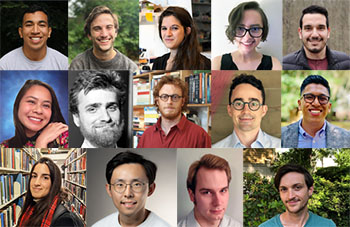 The 14 members of the new cohort include scholars who will pair a doctoral program in Political Science with a master’s in History, Economics with Computer Science, and Neuroscience with Innovation Management and Entrepreneurship.
The 14 members of the new cohort include scholars who will pair a doctoral program in Political Science with a master’s in History, Economics with Computer Science, and Neuroscience with Innovation Management and Entrepreneurship.
With support from the Andrew W. Mellon Foundation and the Graduate School, this program represents the spirit of integrative scholarship, a core value in Brown’s strategic plan that focuses on connections across diverse areas of study.
One creative combination comes from Mai Huynh, a doctoral student in Pathobiology. Her work centers women and people of color with a particular focus on their exclusion in science and medicine. Her work explores the microbiome and the relationship to carcinogens, pollutants, food deserts, and lack of access to women’s healthcare. Her secondary master’s in political science enables her to think about these problems at different scales, by utilizing knowledge of practiced identity, political decision-making, and policy in order to shift scientific research.
This year’s selected cohort and their areas of study include:
- Joseph Aguilera, Ph.D. in Molecular Biology, Cell Biology and Biochemistry, master’s in Data Science
- Nigel Anderson, Ph.D. in Ecology, Evolution and Organismal Biology Ph.D., master’s in Data Science
- Adrianne Corseri, Ph.D. in Neuroscience, master’s in Innovation Management and Entrepreneurship
- Meredith Gilman, Ph.D. in Philosophy, master’s in Classics
- Selahaddin Gumus, Ph.D. in Chemistry., master’s in Innovation Management and Entrepreneurship
- Mai Huynh, PhD. in Pathobiology Ph.D., master’s in Political Science
- Lachlan Kermode, PhD. in Modern Culture and Media, master’s in Computer Science
- Sam McGrath, PhD. in Philosophy, master’s in Cognitive Linguistic & Psychological Sciences
- Samuel Musker, Ph.D. in Philosophy, master’s in Computer Science
- Bryan Natividad, Ph.D. in Sociology, master’s in Data Science
- Irene Rihuete Varea, Ph.D. in Hispanic Studies, master’s in Modern Culture and Media.
- Haoyu Sheng, PhD. in Economics, master’s in Computer Science
- Connor Staggs, Ph.D. in Political Science, master’s in Data Science
- Christopher Woods, Ph.D. in Political Science, master’s in History
Lachlan Kermode highlights the value of the program, “there is no graduate education that I know of that educates in both the history and theory of computing while also offering the opportunity to improve as a technical practitioner, which is exactly what a Ph.D. in Modern Culture and Media and master’s in CS allows.” Kermode emphasizes that the opportunity provides a “huge boon both on the academic job market, and towards career pathways in industry.”
Bryan Natividad aims to understand higher education in general. His work explores the relationship between academic performance and university support services for students with psychiatric disabilities. A sociology Ph.D. student, Natividad suggests, “the Data Science curriculum will conceptually and methodologically enhance my research as I set out to analyze university level data and collect and analyze big data surrounding university services.”
The program also provides ongoing support and opportunities for students to share their work with one another through a series of events that gather them together as a community. These gatherings enable them to discuss the specifics of their research, as well as the challenges of pursuing work that crosses areas of expertise.
Students may use the program to find complementary areas between disciplines, inviting conversations across areas of expertise. Meredith Gilman is a Ph.D. student in Philosophy pursuing a secondary master’s in Classics. With work that engages with the philosophy of Plato, Gilman is pursuing a secondary master’s in order to develop a thorough understanding of the intellectual and artistic landscape of Plato’s contemporaries.
The program not only provides an opportunity to the selected cohort but also strengthens the culture of multi-disciplinary inquiry at Brown, bringing about classroom conversations with a wide range of diverse participants.